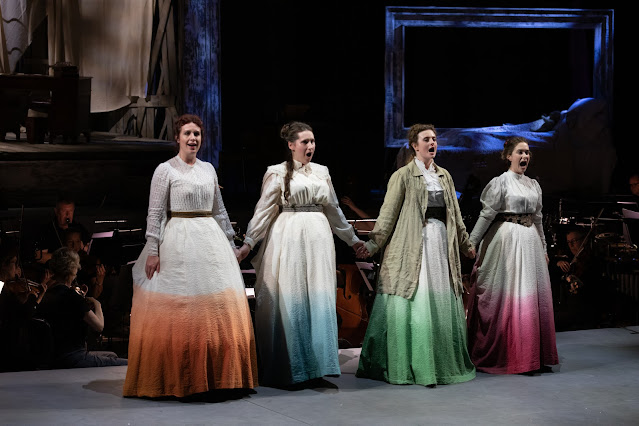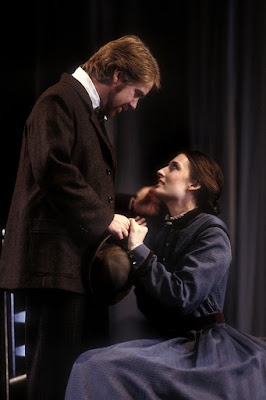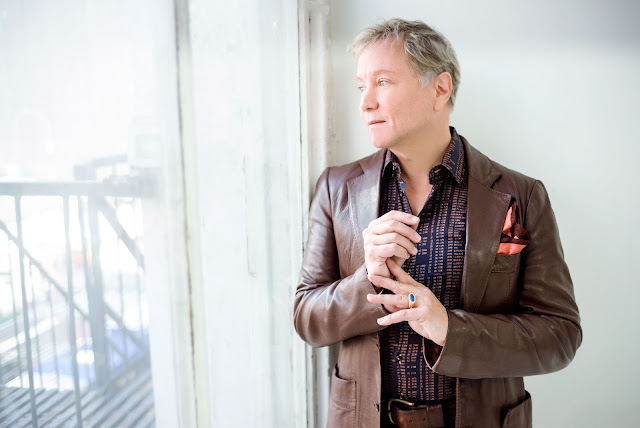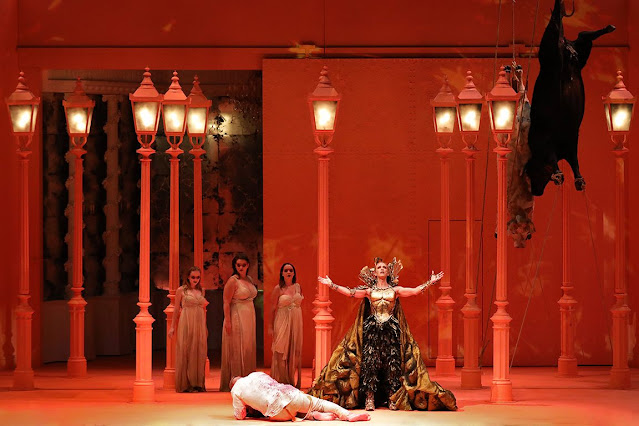 |
| Mark Adamo: Little Women - Kitty Whately as Meg, Elizabeth Karani as Amy, Charlotte Badham as Jo and Harriet Eyley as Beth in Little Women - Opera Holland Park, 2022 (Photo: Ali Wright) |
Mark Adamo's opera Little Women (his first opera) debuted at Houston Grand Opera in 1998 and went on to have major success both in the USA and internationally. The opera has not, until now, received any performances in the UK (though there have been some near misses). The work received its first UK performance on 22 July 2022 at Opera Holland Park, conducted by Sian Edwards and directed by Ella Marchment [see my review, and my interview with Ella]. A few days before the performance, I was lucky enough to be able to chat to Mark Adamo about Little Women and how he views the opera almost 25 years since its creation, as well as chatting about more recent projects and what he will be getting up to next.
Mark has found working on Little Women with Opera Holland Park to be a wonderful experience, and there has been no need for translation, either collegial or emotional, and they will experience what happens on Friday (at the premiere). He has tweaked the opera a little, the opening is slightly different and now all the ghosts that haunt Jo are vocal rather than simply being in the orchestra, which Mark feels makes things a little clearer. Also, in the intervening years, he had made revisions to the orchestration, as he learned that it could come off the page more easily. But for Mark, Little Women remains in 2022 what it was in 1998.
One of the reasons for this is Mark's way of working. He writes his own librettos and does lots of drafts so that by the time he comes to the words and music he is already on something like the 12th draft and is quite clear what the music and worlds should be.
 |
| Mark Adamo: Little Women - Houston Grand Opera, 1998 |
Alcott wrote the book in ten weeks. It wasn't her idea, she was asked to write a book for girls even though her writing was very different. She tried, but was sceptical, commenting 'it reads rather better than I expected'. It is not as planned as her other works and has more of a personal theme in the book.
Mark feels that he has been fortunate to be able to choose his responses to each of his operas, which means that each of his operatic works is very different to its predecessor. After Little Women, full of characters and no plot, with its scenes inside houses, Mark wanted something less internal, something theatrical and something that dealt with adult concerns. The result was Lysistrata, or the Nude Goddess, based on Aristophanes' play, which premiered at Houston Grand Opera in 2005. He read the Aristophanes and found it in complete contrast to Little Women, the play was all plot and no character. This was rather freeing and it was exciting to engage with it, and it gave him different problems leading to quite a free adaptation. And this sort of process has gone one after each of his operas. He is always curious about what an opera can do, so when thinking about the next one he thinks, what else?
The Gospel of St Mary Magdalene (which premiered at San Francisco Opera in 2013) was inspired by an article in the New Yorker talking about texts that give different views of the Christian narrative to the standard Gospels, and Mark thought it would be interesting to revisit the Gospel story from Mary Magdalene's point of view, done in such a way that no-one could say that it could not have happened this way.
Then for Becoming Santa Claus (which premiered at Dallas Opera in 2015) he was set thinking after seeing a performance of Humperdinck's Hansel and Gretel. Finding this a rather spooky piece, he wondered how did it become a standard Christmas piece? He thought about doing something with the Santa Claus myth that would not only be available to people as a holiday event but would serve to introduce people to the opera.
In an ideal world, each opera takes around two years to create (though Lysistrata was delayed by 9/11). He is currently working on his next opera, which he assures me will be different again. He is currently working on the libretto, things are still in the air but he is poised to write the music.
 |
| Mark Adamo: Lysistrata - Houston Grand Opera (2005) |
Another operatic project that he recently completed was the libretto for John Corigliano's The Lord of the Cries which premiered last year (2021) at Santa Fe Opera; John Corigliano is, incidentally, Mark's husband. It was a very different process, writing John a libretto. Mark has known John for decades and his music before that, and Mark wanted John to be excited by the subject and he wrote it for John's voice. His biggest fear was that when writing the text, he would not be able to turn his composer brain off. He tells a salutary story of when composer Giancarlo Menotti wrote the libretto for Samuel Barber's Vanessa (Menotti and Barber were also partners), Barber (who was a trained singer) was singing through a new passage from Vanessa when Menotti shouted from another room, 'That's not how it goes'. Mark wanted to avoid this, he did not want to be so committed to the text that he got in the way of John's music. In the event, Mark found the process rather delicious and he loved being able to see what John made of his text.
The Lord of the Cries fuses the idea of Dracula with Dionysus from Euripedes' The Bacchae! Mark had been reading Bram Stoker's Dracula and thought of 'all these ways that the piece will not work as drama', in particular, that the character of Dracula seemed more of a plot device and had no emotional development. Mark was talking to American playwright, theatre director, and professor Bill Hoffmann (1939-2017), who had written the libretto for John Corigliano's opera The Ghosts of Versailles, and Hoffmann asked how Dracula was going, and Mark commented that it was much more about the over-wrought men who are hunting the vampire than the vampire himself. It wasn't so much about repressed sexuality as about repressed animality (of which sexuality was part), and Hoffmann's succinct response was 'So you are written the Bacchae'.
Mark had had an obsession with Greek literature as a teenager but had never read The Bacchae. He did so and found that it solved all his problems if he mapped the play onto Bram Stoker's novel. He combined both women in the novel into a single one, and then adapted the great play using the personae of the novel! He admits that it sounds a little crazy, but that once you see it on stage it works. Before the performances at Santa Fe, it was difficult to explain and to talk about, but afterwards, everything was as clear as day [see the review on Seen and Heard]
Recently, Mark has also been writing more concert music. He has been fortunate to go from opera to opera for a long time and has wanted to do more concert music. After writing the libretto to The Lord of the Cries, he found it interesting to turn his attention to a new cello concerto, writing music without words. This was a chance to use different parts of his brain separately, working just as a musician. And he loves it.
He will never leave the opera house, it uses so much of everything he has, but he enjoys working as a concert composer. It is unique, so similar to writing for the opera house yet so different. With the cello concerto, he was using a narrative and feels that even if the audience does not understand every detail they will pick it up. But it is a very different challenge. His cello concerto, Last Year, premiered in 2021 and he has a string quartet at the back of his head but is currently in 'new opera land'.
When I ask whether he was always going to be an opera composer he answers yes and no. He was going to be a theatre opera composer, writing works in the manner of Bernstein's Candide and Sondheim's Sweeney Todd. He trained initially as a theatre lyricist and wanted to do what Sondheim did with Sweeney Todd. In pursuit of this, he went to a conservatory and fell in love with the work of being a composer. He began to think of doing his own orchestration rather than others doing it, and his first piece for the concert hall was a 27 minute orchestral work for an AIDS memorial. At the premiere, something happened; he realised that he wasn't just a songwriter with composing skills, that too many people believed in him as a composer.
When the call came about writing an opera on Little Women he felt that he could use all his musical and theatrical training. Little Women was initially planned for a company in Washington, this did not happen and Houston Grand Opera became interested. This threw him into a panic; this was heavy stuff, Houston had commissioned both Bernstein's A Quiet Place (premiered in 1983) and John Adams' Nixon in China (premiered in 1987). But he felt that he had to try and, as he wryly comments, 'here we are'. One of his solaces was that no opera company was likely to reject a libretto as too theatrical, and there was no ceiling for his creativity as he was using trained voices and an acoustic orchestra.
He was able to write musical theatre in a way that he never could in the straight theatre, and he talks about the links between certain types of musical and operatic works. Carmen is a musical in the way it combines music with spoken word, whilst for Mark, La Traviata is close to Sweeney Todd both in its structure and address to the audience. He finds that there is no conflict between dramatic clarity and musical sophistication, and his continuing use of verse in libretto has a strong lineage (even Wagner wrote his librettos in verse) and prose librettos are a more recent invention.
At the end of our conversation, we return to the subject of Little Women. It has nearly happened in the UK for almost 20 years and he is delighted that it is finally coming. The quartet from the opera was performed at the SWAP'ra Gala at Opera Holland Park in 2018 [see my article]. James Clutton (chief executive of Opera Holland Park) commented on the quartet and was eager to bring the opera here.
 |
| Mark Adamo (Photo Daniel Welch) |
Mark mentions George Bernard Shaw's comment about the USA and the UK being two countries separated by a common language. The USA has long welcomed English theatricals and English operas, but the longed-for conversation in the other direction is only just beginning to happen.
[Jake Heggie's Dead Man Walking (2000) received its UK premiere at the Barbican in 2018, Kevin Puts' Silent Night (2011) received its UK premiere at Opera North in 2018. English National Opera perform Jake Heggie's It's a wonderful life (2016) in December 2022 and Jeanine Tesori's Blue (2019) in April 2023]
Mark Adamo: Little Women - Charlotte Badham, Kitty Whately, Harriet Eyley, Elizabeth Karani, director: Ella Marchment, conductor: Sian Edwards/Scott Wilson - 22 July to 5 August, Opera Holland Park
Never miss out on future posts by following us
The blog is free, but I'd be delighted if you were to show your appreciation by buying me a coffee.
Elsewhere on this blog
- Welcome to L'isola di Alcina: Glyndebourne's first production of Handel's opera - opera review
- French-style elegance, Italian lyricism and virtuosity: Adrian Butterfield in Leclair's violin sonatas - record review
- Prom 14: Flavours of late romanticism, Yamada and the CBSO in Rachmaninov and Ethel Smyth - concert review
- Sit back and enjoy: London Early Opera's engagingly virtuosic performance of Handel's pasticcio, Caio Fabbricio - record review
- More than just sisterhood: Mark Adamo's Little Women finally gets its UK premiere in Ella Marchment's imaginative production at Opera Holland Park - opera review
- From Bayreuth to Grimeborn: having assisted at Bayreuth Festival's new Ring Cycle, Peter Selwyn moves on to conduct the concluding parts of the Grimeborn Festival's ambitious Ring Cycle - interview
- Operatic rarities in a striking double bill: Delius' Margot la Rouge and Puccini's Le Villi at Opera Holland Park - opera review
- The Dragon of Wantley: a fine Handelian cast have terrific fun with Lampe's parody of opera seria - CD review
- Purcell writ large: a lavish Dido and Aeneas at the BBC Proms - opera review
- Our Future in Your Hands: Kate Whitley's new oratorio for Buxton used a chorus of children from local schools and students from the RNCM to terrific effect - concert review
- Baroque gem: Hasse's early serenata Antonio e Cleopatra gets an intriguing modern staging in Buxton with some stylish singing - opera review
- Not a kilt in sight: Jacopo Spirei's fascinating production of Rossini's La donna de lago at Buxton - opera review
- ome












No comments:
Post a Comment